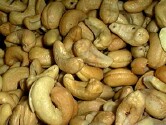
MONDAY, Dec. 23 (HealthDay News) — Women who eat nuts during pregnancy — and who aren’t allergic themselves — are less likely to have kids with nut allergies, a new study suggests.
Dr. Michael Young, an associate clinical professor of pediatrics at Harvard Medical School, and colleagues collected data on more than 8,200 children of mothers who took part in the Nurses’ Health Study II. The women had reported what they ate before, during and after their pregnancies.
About 300 of the children had food allergies. Of those, 140 were allergic to peanuts and tree nuts.
The researchers found that mothers who ate the most peanuts or tree nuts — five times a week or more — had the lowest risk of their child developing an allergy to these nuts.
Children of mothers who were allergic to peanuts or tree nuts, however, did not have a significantly lower risk, the study found.
The report was published online Dec. 23 in the journal JAMA Pediatrics.
The rate of U.S. children allergic to peanuts more than tripled from 0.4 percent in 1997 to 1.4 percent in 2010, according to background information included in the study. Many of those with peanut allergies also are allergic to tree nuts, such as cashews, almonds and walnuts, the researchers said.
“Food allergies have become epidemic,” said Dr. Ruchi Gupta, an associate professor of pediatrics at the Northwestern University Feinberg School of Medicine.
“Our own studies show that 8 percent of kids in the United States have a food allergy — that’s one in 13, about two in every classroom,” said Gupta, the author of an accompanying journal editorial.
Yet why this epidemic is happening remains a mystery, Gupta said. “We do not have any evidence as to what is causing this increase in food allergy,” she said. “It’s some kind of genetic and environmental link.”
The new findings do not demonstrate or prove a cause-and-effect relationship between women eating nuts during pregnancy and lower allergy risk in their children, Young said.
“The results of our study are not strong enough to make dietary recommendations for pregnant women,” he said.
Young said the findings do, however, add to the growing evidence that early introduction of foods increases the development of tolerance and reduces the risk of allergies.
“Our data should reassure pregnant women that they could eat nuts without causing the offspring to be allergic to nuts,” he said.
Gupta agreed. “With the recent increase in food allergies, I think mothers are fearful that eating certain foods may cause their child to develop that food allergy,” she said. But that isn’t backed by any data, she noted.
“Mothers should not be fearful of eating certain foods and should go on with their regular cravings and their regular diets and not avoid things to try to protect their child from allergy,” she said.
This study suggests that exposure to nuts early in life might protect kids from developing an allergy to them — a theory that also has been linked to other foods to which kids are commonly allergic, Gupta said. “The problem is that we do not have enough strong data to recommend this,” she said.
The eight foods to which children are most commonly allergic are peanuts, milk, eggs, tree nuts, shellfish, fin fish, wheat and soy, Gupta said. Children often outgrow these allergies, she said.
“The ones that are most commonly outgrown are egg and milk allergies,” she said. “Things like nuts and fish and shellfish — only about 10 percent to 20 percent [of people] outgrow those allergies.”
The dramatic increase in food allergies is not just an American phenomenon, but is being seen worldwide, Gupta said. “We are definitely seeing higher rates in Canada, Europe, Japan, China, India — all over the world,” she said.
Gupta said she is hopeful that during the next decade it will be discovered why this increase in food allergies is happening and what can be done about it.
More information
To learn more about food allergies, visit the U.S. National Library of Medicine.
Copyright © 2026 HealthDay. All rights reserved.

